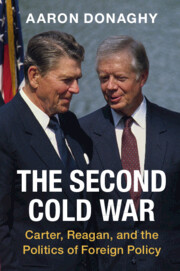Book contents
- The Second Cold War
- Cambridge Studies in US Foreign Relations
- The Second Cold War
- Copyright page
- Dedication
- Contents
- Acknowledgments
- Abbreviations
- Introduction
- 1 The Dwindling of Détente
- 2 “It’s All Political Now”
- 3 To the Right
- 4 Confrontation
- 5 The Nuclear Freeze Movement
- 6 Star Wars and the Evil Empire
- 7 The Most Dangerous Year
- 8 To the Center
- 9 Conciliation
- Epilogue
- Archives
- Notes
- Index
- Cambridge Studies in US Foreign Relations (continued from page ii)
- The Second Cold War
- Cambridge Studies in US Foreign Relations
- The Second Cold War
- Copyright page
- Dedication
- Contents
- Acknowledgments
- Abbreviations
- Introduction
- 1 The Dwindling of Détente
- 2 “It’s All Political Now”
- 3 To the Right
- 4 Confrontation
- 5 The Nuclear Freeze Movement
- 6 Star Wars and the Evil Empire
- 7 The Most Dangerous Year
- 8 To the Center
- 9 Conciliation
- Epilogue
- Archives
- Notes
- Index
- Cambridge Studies in US Foreign Relations (continued from page ii)
Summary
Chapter 9 covers 1985, beginning with the election of Mikhail Gorbachev as Soviet leader. It discusses the Soviet “new thinking,” Gorbachev’s desire to implement reform, and his decision to remove Gromyko as foreign minister. For the newly re-elected US president, Gorbachev’s arrival was perfectly timed. Riding a wave of popularity and political strength, Reagan stood by the policy of engagement and moderation. He rejected the advice of hard-liners who persisted in opposing realistic negotiation. Despite his early misgivings, Reagan realized that Gorbachev was a “somewhat different breed” of Soviet leader. The Geneva summit of November 1985 – the first meeting of a US and Soviet leader in six and a half years – marked the end of the Second Cold War. Although no agreement on arms control emerged, the meeting set a new tone for US–Soviet relations. It provided a base for trust between two men with different backgrounds and philosophies. Reagan and Gorbachev viewed the summit as a personal breakthrough. There were many issues to resolve, and Gorbachev’s policies would evolve gradually. But the events of 1985 did much to allay the tension and mutual suspicion between the two nations.
Keywords
- Type
- Chapter
- Information
- The Second Cold WarCarter, Reagan, and the Politics of Foreign Policy, pp. 252 - 282Publisher: Cambridge University PressPrint publication year: 2021

